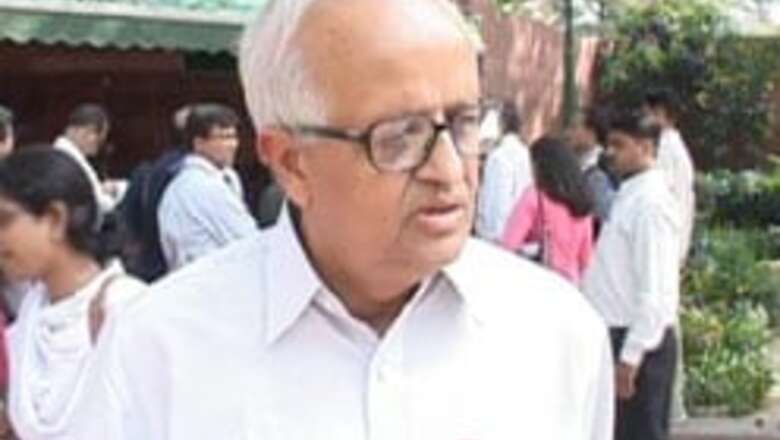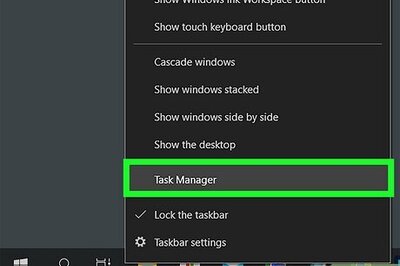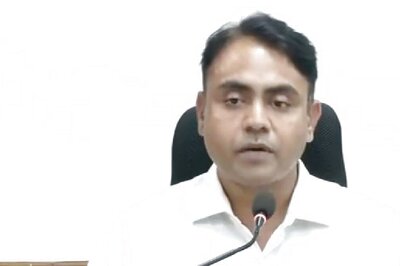
views
New Delhi: When one of the most eminent economists of our times presents his views on India’s politics and says it’s a backbencher’s take, chances are you'd be in for a rather forward-looking point of view.
An economist, member of the Rajya Sabha and former Governor of the Reserve Bank of India Bimal Jalan launched his book, India’s Politics — A View from the Backbench, on Tuesday.
Unlike his previous works, in this book Jalan takes a detour from economics to politics. He focuses on the working of Parliament and the complex mechanics of the Indian democracy.
Speaking on the sidelines of the launch, Jalan said that as a Member of Parliament and as a keen observer of Indian politics, there is much to be proud of, but there are some areas of concern that require attention. "Although our democracy is lauded, there is systemic sign of malaise within it,” he said.
He went on to term the Indian democracy as a “messy business” and said that the extent and depth of messiness is only increasing over time. And one of the fallouts of the mess was the emergence of multi-party coalitions as a regular form of Government and their relatively short life expectancy. In his book, Jalan puts forward a 10-point programme to make the Indian democracy more stable, transparent and accountable.
While the search for power and the compulsions of coalition politics were the primary drivers of political behaviour, the fundamental issue Jalan said was “whether the emergence of coalitions, which have a short life expectancy, was visualised by the architects of the Constitution”.
The launch was followed by a discussion on the state of Indian politics. Among the panel to discuss the intricacies of Indian democracy, its failings and their possible solutions were Editor-in-chief Indian Express, Shekhar Gupta; MD and CEO of Centre for Policy and Research, Pratap Bhanu Mehta; Managing Director and Editor of The Pioneer, Chandan Mitra; Editor-in-chief of CNN-IBN, Rajdeep Sardesai; Editor and Publisher of Business Standard TN Ninan and Managing partner of Counselage, Suhel Seth.
The institutional confusion
MD and CEO of Centre for Policy and Research, Pratap Bhanu Mehta, began the discussion by giving his take on the book: “It is a wonderful book and certainly not by a backbencher. It weaves together the different facets of the political system. However, it leaves one question unanswered—if one is talking in terms of policies or institutional solutions.”
Mehta said that the political framework can function effectively only when there are certain lakshman rekhas. “We know that there are political constraints and in fact 90 per cent of them can be shielded. But then, why is that every institution is confused about its role? Why is it that there is always blame-swapping whenever anything goes wrong?”
Editor-in-chief Indian Express, Shekhar Gupta, however disagreed: “I don't find that our institutions weakening. In fact, for the past five years, some of the institutions, like the judiciary, are strengthening.”
Political consensus mandatory
As he carried the discussion forward, Editor-in-chief Indian Express, Shekhar Gupta, said, “In a democracy, everything should run on a consensus. A classic example is the Indo-US nuclear deal. Never was a foreign policy issue debated earlier. For the first time, everyone, including the people and the Members of Parliament, participated in the process.”
While drawing parallels with the Shimla agreement, Gupta said that there were no questions raised and no answers offered when Indira Gandhi signed the agreement in 1972. The Indian democracy has seen a sea change since then and the fact that India’s premier industry chambers like CII and ASSOCHAM call for the economy to be run on a consensus serves as a testimony to it.
Gupta’s optimism about the systemic change was unabated as he went on to speak about the recent “intellectual argument” between Prime Minister Manmohan Singh and CJI KG Balakrishnan on the role of judicial review in a democracy. “It is heartening that these debates are happening," he said. The Parliamentary debates have come a long way since the days of halle mein paas karaa do (Getting a Bill passed amidst confusion), he added.
The ideological muddle
The root cause of the so-called consensual vacuum, Managing Director and Editor of The Pioneer Chandan Mitra, said was because political parties in general and politicians in particular did not have an ideology. “I agree with Shekhar that everything should be debated and be put out in the open. Right now, there is no serious ideological debate on any issue,” he added.
PAGE_BREAK
No wonder then that emergence of coalitions has spelt the death of ideologies per se. Mitra, a member of the Rajya Sabha, went on to explain how the Ministry of Rural Development had achieved a sort of ideological synchronisation. “In my committee, there is a great consensus amongst the members. We have not had a vote till date,” he said.
The coalition bug
While taking an apparent dig at coalitions, Chandan Mitra said the political parties have ceased to strive for the mid-way bare majority mark of 272 seats in the Lok Sabha. All they vie for is 150 seats because they know they can form the Government even with that figure.
This is where the Aya Ram, Gaya Ram — a euphemism for defection — category of legislators comes in. Mitra pointed out that it was due to politicians who lacked an ideology that Parliament had “lost its importance as a forum of debate and reduced to being an akhada of sorts”.
The final word
As the debate gained steam, Editor-in-chief of CNN-IBN Rajdeep Sardesai pointed out that the increasing focus on political issues was perhaps due to the rise of pink papers and the middle class elite.
While terming Jalan’s 10-point programme as unobjectionable, Sardesai reasoned that it was perhaps “a view only from Delhi”. He went on to say that outside Delhi, the Government had virtually collapsed — the Congress had not held organisational elections for the past 24 months and the members of the BJP were mostly engaged in bringing their comrades down. “The ideological divide is blurred,” he said.
He alluded that the 10-point programme that intended to make the Indian democracy more stable was rather idealistic and that no one in the bureaucracy would really be willing to implement it.
Sardesai added that the media had “dumbed down” considerably and was presenting content to titillate the viewers’ sensibilities. “We've lost the appetite to discuss issues and it is a time for change,” he said.
As the debate drew to a close, the consensus was that political mosaic was in dire need of a paradigm shift, which would only be possible through eternal vigilance and constant debate.




















Comments
0 comment